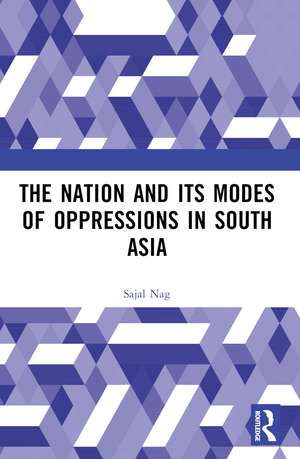Nation and Its Modes of Oppressions in South Asia
Autor Sajal Nagen Limba Engleză Paperback – 26 aug 2024
This book examines the idea of a nation, as it originated in medieval Europe, as an unending process of 'othering' individuals, groups, and communities to establish its hegemony, exclusivity, and absolute power within a political discourse. It sheds light on how these new political frameworks in the name of nationalism resulted in conflicts and bloodshed. It unleashed politics of retribution and facilitated majoritarianism, minority persecution, and collective authoritarianism which devastated individuals and collectivities. Further, the author also discusses various prominent ideas and contemporary theories on nationalism alongside pivotal socio-cultural factors which have significantly shaped the formation of modern nation states and their politics.
Topical and nuanced, this book will be indispensable to researchers, scholars, and readers interested in nationalism, political science, modern history, political theory, political philosophy, political sociology, political history, post-colonial studies, and South Asia studies.
| Toate formatele și edițiile | Preț | Express |
|---|---|---|
| Paperback (1) | 401.79 lei 43-57 zile | |
| Taylor & Francis – 26 aug 2024 | 401.79 lei 43-57 zile | |
| Hardback (1) | 906.84 lei 43-57 zile | |
| Taylor & Francis – 30 dec 2022 | 906.84 lei 43-57 zile |
Preț: 401.79 lei
Nou
Puncte Express: 603
Preț estimativ în valută:
76.88€ • 80.47$ • 63.99£
76.88€ • 80.47$ • 63.99£
Carte tipărită la comandă
Livrare economică 31 martie-14 aprilie
Preluare comenzi: 021 569.72.76
Specificații
ISBN-13: 9781032397320
ISBN-10: 1032397322
Pagini: 400
Dimensiuni: 156 x 234 mm
Greutate: 0.74 kg
Ediția:1
Editura: Taylor & Francis
Colecția Routledge India
Locul publicării:Oxford, United Kingdom
ISBN-10: 1032397322
Pagini: 400
Dimensiuni: 156 x 234 mm
Greutate: 0.74 kg
Ediția:1
Editura: Taylor & Francis
Colecția Routledge India
Locul publicării:Oxford, United Kingdom
Public țintă
Academic, Postgraduate, and Undergraduate CoreCuprins
1.The God of Modernity 2. Advent of ‘Nation’ in South Asia 3. Extending the Geography 4.Tyranny of Language 5. Nation Begets Nations 6. Search for National Icons 7. Ousted From the Nation 8. Caught Between Nations 9. Retribution as Nationalism 10. Exiled by the Nation 11. Nation and its Outsiders 12. Nation without Women 13. Nation and its Dissenters 14. Betrayal of the God.
Notă biografică
Sajal Nag is currently Professor and Head, Department of History and Dean, School of Social Sciences, Assam University, Silchar. He was the first Netaji Subhash Chandra Bose Chair Professor of Social Sciences, Presidency University, Kolkata, and a former Commonwealth Fellow 2004-05, Charles Wallace Fellow at the University of Cambridge 2008 and Senior Fellow at Nehru Memorial Museum and Library, 2013-2014. Some of his publications include The Uprising: Colonial State, Christian Missionaries, and Anti Slavery movement in North East India, 1907-1950, (2016); Bridging State and Nation: Politics of Peace in Nagaland and Mizoram, with Rita Manchanda and Tapan Bose, (2015), Blending Region and Nation; Essays in Honour of Prof Amalendu Guha, (2019), and The Beleaguered Nation: Making and Unmaking of the Assamese Nationality, (New Delhi, 2016), Pied Pipers in North East India: Bamboo Flowers, Rat famine and Politics of Philanthropy, (Delhi, 2008); Playing with Nature: History and Politics of Environment in North East India, Routledge, Delhi, 2016, Forces of Nature: Essays in History and Politics of Environment in India, Routledge, Delhi 2016, Contesting Marginality: Ethnicity, Insurgency and Sub Nationalism in North East India, (Delhi, 2002), Making of the Union: Integration of Princely States and Excluded Areas 1947-50, (2004).
Descriere
This volume examines nationhood as a concept and how it became the basis of political discourse in South Asia. It studies the emergence of nationalism in modern states as a powerful, omnipotent, and omnipresent form of political identity in the nineteenth and twentieth centuries.
